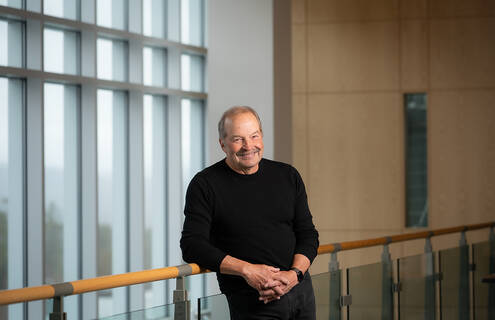
It’s been fascinating for a basic scientist, an immunologist, to move one’s discoveries into humans.
Randolph J. Noelle, PhDThis spring, an esteemed group of scientists gathered to present their greatest work in immunology and cancer immunotherapy in a retirement symposium for Dartmouth Cancer Center researcher Randolph J. Noelle, PhD. These were academic professors, associate deans, chief scientific officers, molecular biologists and other leaders in their field.
Collectively, they are also Noelle’s proudest accomplishment in his distinguished 40-year career—Not the discovery of molecules and engineering of antibodies now being used in drugs that enable the body’s immune system to fight cancer and other autoimmune diseases, but the ongoing contributions of these notable scientists—because they were once students or post-doctoral fellows in his lab. “My greatest achievement is having provided the mentoring and environment to foster the professional heights that they all have achieved,” Noelle sums up.
Forty years ago, when Noelle began his career at Dartmouth, “Immunotherapy,” a field that seeks to harness the body's immune system to fight cancer and other diseases, was still in its infancy, with dismal response rates. Over the four decades that followed, nestled within the collaborative spirit of an institution that blurs the lines between undergraduate curiosity and medical innovation, Noelle progressed through a career that would pin immunotherapy in a prominent place on the map of discovery.
Igniting a thrill
Noelle's fascination with science traces back to his high school days, ignited by a biology teacher whose enthusiasm raised his curiosity about the thrill of scientific discovery. This early spark of interest led him to the field of cellular and molecular immunology, where the quest to discover molecules that regulate the immune system became his life's work. “We’ve been fortunate over the years,” he notes.
But the journey wasn't without its trials. “The struggles of an assistant professor can’t be overstated,” Noelle says. The pursuit of highly competitive funding is a constant, and the need for recognition and scientific breakthroughs are persistent demands. Yet, determination and the unwavering support of mentors got him through the challenging early years.
First milestones
His first breakthrough came in 1992 with the discovery of the molecule “CD40 ligand,” a key molecule that instructs your immune system to turn on and to make antibodies and T cells that can kill tumor cells. “I wish I could say it was overwhelming intellect that provided that opportunity. But it was really a bit of intellect and an enormous amount of luck—right place, right time, right group of people, and we found it.”
This discovery led to the first antibody drug for human use, the development of which continued through the 1990s in a journey that would see its share of triumphs and setbacks. The initial excitement was tempered by adverse events in early clinical trials that halted the program. Noelle's lab, in partnership with ImmuNext, the biotech company he co-founded, spent the next decade re-engineering the antibody and re-igniting its progress.
By 2017, the re-imagined antibody was licensed for use, culminating in a landmark publication in the New England Journal of Medicine in 2024, showcasing its use in treating multiple sclerosis. “It is a spectacular drug,” he notes.
Immunotherapy in cancer
Another story is about the revolution of immunotherapy in cancer, led by VISTA. Discovered in Noelle’s lab in 2014, VISTA is a member of the “checkpoint regulator” molecules that put the brakes on the immune system. Noelle’s team made antibodies to take those brakes off. Today, the antibodies are working their way through Phase I clinical trials in anxiously awaited hopes of becoming new drugs to enhance the immune system. “It’s been fascinating for a basic scientist, an immunologist, to move one’s discoveries into humans,” he says.
We really have such a unique and special environment where an undergraduate college is so closely integrated with a medical center, a superlative graduate program, and a cancer center that does a lot of great research. My job was to create an exciting, congenial, interactive environment where people work together, find money, provide mentoring, and keep people enthusiastic about what they really want to do. The interaction drives success for all of us.
As Noelle reflects on his career, he can see that success in drug development and immunotherapy is as much about being in the right place at the right time and surrounding yourself with the right people as it is about intellect and perseverance. “We really have such a unique and special environment where an undergraduate college is so closely integrated with a medical center, a superlative graduate program, and a cancer center that does a lot of great research. My job was to create an exciting, congenial, interactive environment where people work together, find money, provide mentoring, and keep people enthusiastic about what they really want to do. The interaction drives success for all of us.”
And it has worked. Noelle’s contributions extend beyond the molecules and antibodies that have emerged from his lab. His legacy is one of inspiration, and a reminder that curiosity, when coupled with support and the relentless determination of a small institution to compete in the world’s field, can lead to innovations that transform lives.
The field of immunotherapy continues to evolve. New technologies and targeted genetic and cellular approaches are unleashing new potential, such as precision cancer vaccines, for which there is an enormous amount of excitement on the horizon. Noelle's journey, as evidenced by the robust presentation of science filling his retirement “reunion” as he prefers to call it, stands to guide the next generation of scientists toward these revolutionary frontiers of medical science. He may be working on his backhand, but he will be watching when that happens.